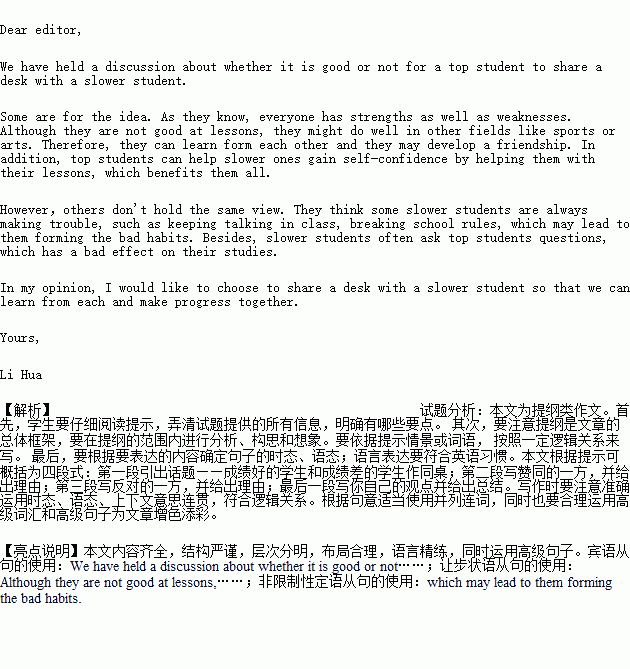题目内容
假如你叫李华,是一位成绩优秀的学生,你班班主任在安排座位时,让成绩好的学生和成绩差的学生作同桌,这在你们班成绩优秀的学生中引起了反响,大家就此进行了讨论。请以书信形式向报社编辑写封信,陈述学生讨论结果以及个人观点。
赞同 | 反对 | 你的观点 |
1.人人有长处和不足,成绩差的学生也有可取之处; 2.通过帮助学习差的学生的学习从而使他们建立自信。 | 1.部分学习差的学生常常违反校规,担心自己会受影响,养成坏习惯。 2.老是问问题,使自己不能专心学习。 |
注意:1.词数:100左右,短文的开头已为你写好,不计入总词数。
2.短文需包括表中所有要点,内容可适当发挥,以使行文连贯。
3.参考词汇:成绩差的学生:a slower student
____________________________________________________________________________________________
____________________________________________________________________________________________
____________________________________________________________________________________________
____________________________________________________________________________________________
____________________________________________________________________________________________
____________________________________________________________________________________________
____________________________________________________________________________________________
____________________________________________________________________


 day years ago when they had first met. “Do you ____ wonder why I was carrying so many things home that day?” asked Bill. “You see, I ____ out my locker because I didn’t want to leave a mess(脏乱) ____ anyone else. I had planned to run away and I was going home to ____ my things. But after we spent some time together ____ and laughing, I realized that ____ I had done that, I would have ____ a new friend and missed all the fun we would have together. So you see, Mark, when you picked up my books that day, you did a lot more. You___ my life.”
day years ago when they had first met. “Do you ____ wonder why I was carrying so many things home that day?” asked Bill. “You see, I ____ out my locker because I didn’t want to leave a mess(脏乱) ____ anyone else. I had planned to run away and I was going home to ____ my things. But after we spent some time together ____ and laughing, I realized that ____ I had done that, I would have ____ a new friend and missed all the fun we would have together. So you see, Mark, when you picked up my books that day, you did a lot more. You___ my life.”